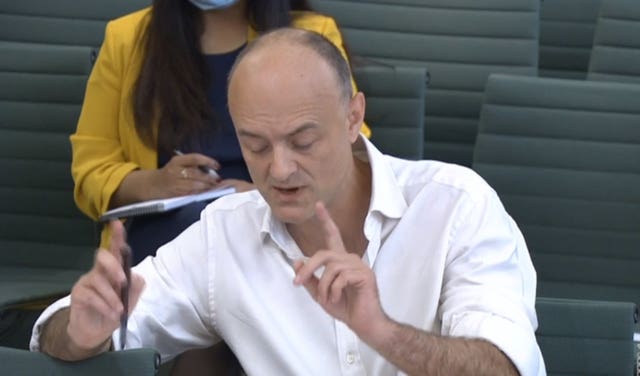Dominic Cummings: when public needed us most, Government failed
Boris Johnson’s former aide said ministers and officials fell short of what the public should expect in a crisis.

People died unnecessarily because of Government failings during the coronavirus pandemic, Dominic Cummings told MPs.
Boris Johnson’s former aide said he was sorry that ministers, officials and advisers had fallen “disastrously short” of the standards the public should expect in a crisis.
Mr Cummings was giving evidence to the Commons health and science committees with No 10 braced for explosive claims about the Prime Minister’s handling of the pandemic.
The former adviser, who left Downing Street last year after a behind-the-scenes power struggle, told the MPs: “The truth is that senior ministers, senior officials, senior advisers like me fell disastrously short of the standards that the public has a right to expect of its Government in a crisis like this.
“When the public needed us most the Government failed.
“I would like to say to all the families of those who died unnecessarily how sorry I am for the mistakes that were made and for my own mistakes at that.”
Mr said he regrets that he “did not follow up” and “push” on pandemic preparations at the end of January 2020, adding that it was not until the end of February that it was realised the plans were “hollow”.
The Government was not operating on a “war footing” in February 2020 as the global crisis mounted and “lots of key people were literally skiing in the middle of February”, he said.
Mr Cummings admitted not attending early Cobra meetings – claiming information leaked too frequently from them and he would rather discuss issues in conversations with chief scientific adviser Sir Patrick Vallance.
The former No 10 insider also suggested Mr Johnson did not chair early meetings of Cobra because he did not consider the virus to be serious.
He said the Prime Minister thought the issue was like “swine flu” and did not need to cause concern.
And he suggested that Mr Johnson had considered being injected with coronavirus by chief medical officer Professor Chris Whitty to prove it was not that serious.

“The view of various officials inside No 10 was – if we have the Prime Minister chairing Cobra meetings and he just tells everyone ‘it’s swine flu, don’t worry about it, I’m going to get Chris Whitty to inject me live on TV with coronavirus so everyone realises it’s nothing to be frightened of’ – that would not help actually serious planning,” he said.
Ahead of his appearance before MPs, Mr Cummings tweeted a picture of a whiteboard on which the Government’s “plan B” for the first wave of the virus was sketched out.
Mr Cummings had said the Government’s original plan was for limited intervention with the hope of achieving herd immunity but that was abandoned when it became clear the scale of the death toll that would result.
On Wednesday morning Cabinet minister Grant Shapps dismissed Mr Cummings’ evidence as a “sideshow”.
He said the focus on Mr Cummings as “Westminster bubble stuff” and “I do find this obsession about one single adviser a bit odd”.
Asked whether Mr Cummings is a liar, Transport Secretary Grant Shapps told BBC Breakfast: “I will leave it to others to judge how reliable a witness that former adviser happens to be.”
Asked whether Mr Cummings was a “trusted adviser”, Mr Shapps said: “He was certainly an adviser of the Government. It’s for others to decide the trusted part of it.”
Mr Cummings’ claims about the Government having a secret policy for herd immunity at the start of the pandemic were also challenged.
WhatsApp messages from March 2020 reported by Politico showed that, while in charge of No 10, Mr Cummings privately ordered senior Cabinet ministers to deny herd immunity was ever government policy.
That calls into question Mr Cummings’ claims to have sought transparency and honesty while claiming ministers “lied” about herd immunity.





